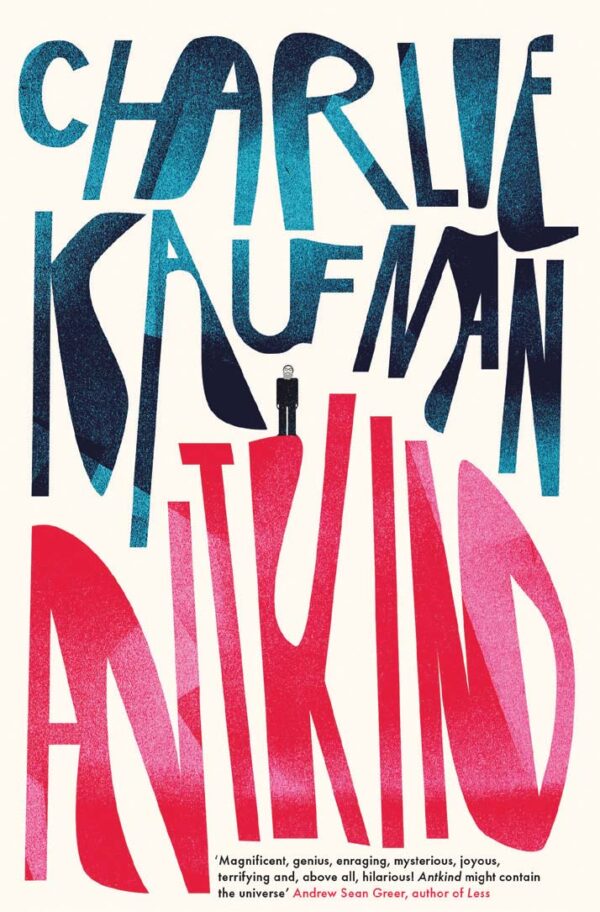
David Prendeville
The first novel by the great Charlie Kaufman is every bit as original, disturbing and hilarious as one would expect. The Oscar-winning screenwriter of unique, brilliant films such as Being John Malkovich and Eternal Sunshine of the Spotless Mind, and writer-director of the masterful Synecdoche, New York, has here crafted an extraordinary piece of postmodern literature. This novel pushes the boundaries of its form every bit as much as Kaufman’s film work has sought to do.
The novel follows film critic B. Rosenberger Rosenberg, a narcissistic, washed-up film critic. The thrust of the plot, for what there is of it, is around B’s discovery of an undiscovered film by an elderly outsider, Ingo Cuthbert. The film itself is a stop-motion epic that follows, among other things, the travails of an Abott and Costello-like comedy duo known as Mudd and Molloy.
Ingo’s film is three months long and took Ingo ninety years to make. As well as constructing all the puppets used in the film, Ingo also created puppets who never occupy the frame, known as The Unseen, as a means to express the true nature of social exclusion.
In the course of B watching the film, Ingo dies. B ignores Ingo’s request that the film be destroyed once B has viewed it. Instead, B attempts to take this marvellous discovery with him back to New York. However, en route, in B’s car, the nitrate film catches fire, thus destroying Ingo’s unsung masterpiece and B’s shot at relevance in the film critic community.
All that remains of the film is a single frame. B believes from this single frame he may be able to create a novelised recreation of Ingo’s lost masterpiece, using his “eidetic” memory. However, B finds it more difficult to remember the film than he expects. He undergoes a labyrinthine journey through his mind, under the watchful eye of hypnotist Brassini in an attempt to relocate his memories of the film.
Along the way, he becomes a shoe salesman, a clown and has dreams in which he is visited by a beautiful robot from the future, who needs him to enter the mind of Donald Trump, or Trunk, as he’s known in the future. Through all this B exercises his innate ability to fall into manholes and is concerned about his continued shrinking. He wonders if there is some higher power over him? And one that takes great humour in his suffering?
This is a novel that is endlessly rich in imagination and wit. The central theme (if there is one), appears to be around the role of humour and comedy in society. In doing so, Kaufman has crafted something that is perhaps most notable for just how funny it is. Segments are genuinely laugh out loud hilarious, Kaufman’s humour the driest of dry wit and his imagination endless.
There are clear parallels with some of Kaufman’s film work. B occupies the mind of others in a way similar to the characters in Being John Malkovich. The theme of memory runs deep throughout the novel and the way it is wrought is similar to Eternal Sunshine of the Spotless Mind.
The haunting engagement with mortality seen in Synecdoche, New York also lingers throughout the novel. The obsession with puppets calls to mind Being John Malkovich and, more pertinently, Kaufman’s terrific 2016 stop-motion black comedy Anomalisa. And resembling Adaptation, this is a novel about creating, about writing and the nature of fiction. Like that film, it is also deeply self-reflexive. B frequently chimes in with assertions on films. B is a big fan of Jean-Luc Godard and Judd Apatow, but reserves his most bitter disdain for the films of one Charlie Kaufman.
This is a wonderful, one-of-a-kind book. Conspicuously unfilmable, this hugely ambitious work, while certainly not for everyone, has real depth to it. It is wonderfully wry in its observations and outrageously creative in its scenarios. Highly recommended, and a must-read for Kaufman fans.



